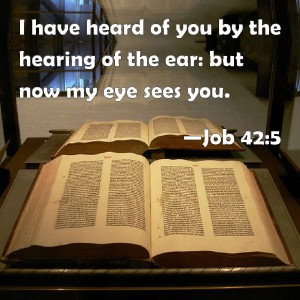The definition of despair is to lose all hope. Hope is vital to the Christian walk. Hope is what keeps us going when trials surround us. If our eyes are cast down in despair we see only our weary feet trudging slowly along. Hope has our eyes look upward toward Jesus. It changes our perspective.
Yet there are times in life when we feel like saying, “God, where are you?” We question if God is really there and wonder if he’s aware of our situation. This feeling is one even the most righteous of men have had at times in their lives. Let’s look at three examples.
Habakkuk
Habakkuk was a prophet, a messenger from God. God’s people had problems with their dedication and Habakkuk was given the task of telling them to return to God. Well, no one was interested in his message. Habakkuk was frustrated with God’s people, with life, and with God. Finally enough was enough! Habakkuk lost it and let God know exactly how he felt. “How long, O Lord, must I call for help, but you do not listen? Or cry out to you, ‘Violence!’ but you do not save? Why do you make me look at injustice? Why do you tolerate wrong?” (Habakkuk 1:1-6)
How many of us have felt this way? We ask God, “How long do I have to wait? Why are letting this happen to me? Where are you?”
God responded to Habakkuk and told him to be patient, to wait and see! God was doing a whole bunch of stuff behind the scenes that Habakkuk wasn’t aware of. (Habakkuk 1:5-11) Things are not always what they appear to be on the surface. God is aware of everything and has not forgotten us or his promises to us.
Job
Job is another example. He tried his best to remain loyal and trust God even after his ten children died, his wealth was lost, and his skin was rotting. Yet he kept his faith saying, “The Lord gave and the Lord has taken away; blessed be the name of the Lord.” (Job 1:21) Also, “Shall we receive good at the hand of God and shall we not receive evil?” (Job 2:10)
But finally Job reached his breaking point and lost it. He said, “I cry out to you but you do not answer? You have become cruel to me.” In other words, “Where are you, God? Don’t you even care what I’m going through?”
God didn’t say, “Oh I’m sorry, Job. I’ve been so busy I haven’t had time to consider your dire situation.” His response was, “Listen Job, who are you to question me? Where were you when I laid the foundations of the earth?” (Job 38:4) God goes on to explain why he is God and Job is not. (Job 38 – 41)
God doesn’t do this to prove he is great and Job is nothing. God was telling Job not to lose sight of who God is. God is God and perfectly capable of controlling everything. But more than that, God wasn’t trying to teach Job as much he was trying to open his eyes, so he could see from a different perspective. And we know Job got the message because he said, “I have heard you, but now I see you.” (Job 42:5) That’s some deep spiritual stuff.
David
David was a man after God’s own heart but he wasn’t beyond frustration. He was anointed king of Israel but Saul wasn’t going to relinquish the throne. David had to stay in hiding. Even after Saul died David had turmoil. There were battles to be won. There was the whole adultery thing with Bathsheba and God allowing their first born son to die. There were times David felt that God was distant and said, “How long will you forget me God? How long will you hide your face from me? How long will my enemy be exalted over me?” (Psalm 13:1-2)
However, David seemed to have the ability to pray himself out of despair by focusing on who God is. He goes on to say, “I trust in your mercy. My heart rejoices in your salvation.” (Psalm 13:5-6) David was the master of positive “self talk” by focusing on God. Look at Psalm 42:5-8 which basically says, “Why are you down cast, O my soul? Remember God’s greatness! Hope in God! Praise God!
Here’s the deal on despair. We can’t afford to rely on our feelings. Feelings are misleading. We must focus on what we know. Sure we can tell God how we feel, but let’s also tell him what we know. “Lord, I know you are here with me. I know you care deeply about what I’m going through. I don’t always know what you are doing but I know you are doing something. I know you are great. I know you are merciful. I know you love me. I know you will work this big mess out so you can be glorified.”
Remember, the opposite of despair is hope. Hope from a spiritual perspective is not just wishful thinking, it is assurance. So no matter how bad our situation is, we can be assured of this – we have Christ in us which is our hope (assurance) of glory. (Colossians 1:27)





